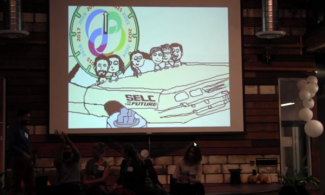Taking the cooperative advantage to scale: 1
Thank you, John McNamara for advancing the conversation about the opportunities, issues, and problems of taking the cooperative advantage to scale. For the cooperative enterprise to become a major business model in this country, we have to demonstrate that it can compete effectively at all levels of scale, not just at the mom-and-pop and small business levels, and can do so democratically.
John recently posted a series of articles on his blog addressing this challenge. More, he highlighted it as being the major issue the worker cooperative movement needs to address, and committed himself to making it a major priority of his work as a member of the USFWC board. (He posted the series on his blog, The Worker's Paradise over several days: September 13 to 23. He also posted a related piece on his other blog, Breathing Lessons.)
From my point of view John has zeroed in on the core problem?democratic control of a cooperative enterprise losing out to top/down governance. I have blogged this issue recently (http://www.geo.coop/node/465 and http://www.geo.coop/node/488 , as has Nancy Folbre twice on the NYTimes blog Economix, Workers of the World, Incorporate and Is Another Economics Possible . But neither of us addressed it as comprehensively as John now has.
I will be responding in depth to John?s series over the next few days. Here I want to first outline the differing approaches each of us uses in thinking about the problems involved in moving to scale. In my next blog I want to summarize John?s thinking?or at least what I think he is saying. In future posts I will elaborate on our views of the various elements to this major opportunity/problem.
The structural and cultural approaches
John views the problem primarily from what I would call a structural approach. That is, he focuses on the structural dynamics of the cooperative enterprise in analyzing the problem and proposing remedies. I come at the dynamics from a cultural and educational approach. That is, it?s the culture, embedded in its members, that is the dynamic that drives the structures of the culture. For either approach to be useful they have to be used together. Think of them as two strands of a double-helix, the two poles of a dialectic. Or, as the ?inside? and ?outside? of a person. Or, the left and right of something.
Let me re-phrase the core problem a little differently than I did above in order to clarify the two approaches. We need to develop strategies and practices for maintaining substantial democratic control of our cooperative enterprises as they expand and are in danger of top/down governance becoming the dominant influence within those enterprises. Growing an enterprise leads to more stores and more members, and the prevailing tendency is for that to lead to a weakening of the members? voices and the rise of a top/down governance that waters down any ?cooperative advantage.? And the same danger will confront the whole movement, if it begins to expand to scale as it seeks to become a major business model in this country.
The structural approach to this problem emphasizes developing the necessary democratic structures within a cooperative enterprise to prevent, offset, countervail?choose your verb?this powerful tendency. On the other hand, the cultural/psychological approach emphasizes an urgent need for developing deep educational processes so that members can participate in for a) learning how to significantly develop their innate capacities for cooperation, and b) learning how to empower themselves far more fully.
The two lines of development are inseparable, if we are to become a viable democratic model for business enterprises. But there is an overwhelming tendency (which is probably more unconscious than conscious) in all US democratic movements to think that if we create the appropriate participatory structures we will get the participation we need for democratic control. Nothing could be further from the truth, in my opinion. After 30 years of research into what it takes to build and sustain a cooperative culture of 70 to 100 people, I have come to two rather firm conclusions:
· that a cooperative culture is the product of a reciprocal dynamic in which members create the structures that shape the members
· that to create a cooperative culture within a predominantly top/down culture like that of the US requires from the outset a deep re-education of the members since they are already deeply conditioned to top/down behavior, attitudes, and beliefs and are, in fact, now the carriers of that top/down culture.
My most profound personal learning in those 30 years was how I was, in fact, a loud carrier of the top/down culture I was dedicated to changing out there.
I hope this blog provides a context in which all of us can connect and use both approaches as I critique John?s series. My intent is to expand our conversation cooperatively, and I am inviting him and anyone else who wishes to comment liberally (not neo-liberally, please) on my blog. Next, I will give my summary of what I think John is saying.


Add new comment